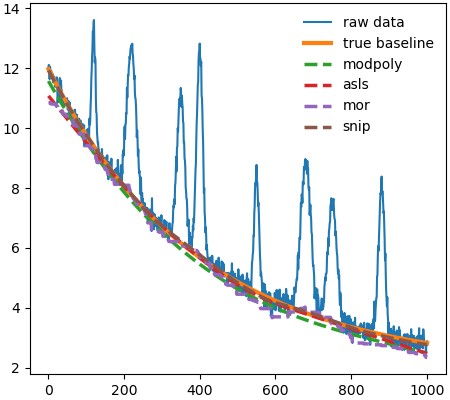A library of algorithms for the baseline correction of experimental data.
Project description







pybaselines is a library of algorithms for the baseline correction of experimental data.
For Python 3.9 or later
Open Source: BSD 3-Clause License
Source Code: https://github.com/derb12/pybaselines
Documentation: https://pybaselines.readthedocs.io.
Introduction
pybaselines is a Python library that provides many different algorithms for performing baseline correction on data from experimental techniques such as Raman, FTIR, NMR, XRD, XRF, PIXE, MALDI-TOF, LIBS, etc. The aim of the project is to provide a semi-unified API to allow quickly testing and comparing multiple baseline correction algorithms to find the best one for a set of data.
pybaselines has 50+ baseline correction algorithms. These include popular algorithms, such as AsLS, airPLS, ModPoly, and SNIP, as well as many lesser known algorithms. Most algorithms are adapted directly from literature, although there are a few that are unique to pybaselines, such as penalized spline versions of Whittaker-smoothing-based algorithms. The full list of implemented algorithms can be found in the documentation.
Installation
Stable Release
pybaselines can be installed from pypi using pip, by running the following command in the terminal:
pip install pybaselinespybaselines can alternatively be installed from the conda-forge channel using conda by running:
conda install -c conda-forge pybaselinesDevelopment Version
The sources for pybaselines can be downloaded from the GitHub repo. To install the current version of pybaselines from GitHub, run:
pip install git+https://github.com/derb12/pybaselines.gitDependencies
pybaselines requires Python version 3.9 or later and the following libraries:
All of the required libraries should be automatically installed when installing pybaselines using any of the installation methods above.
The optional dependencies for pybaselines are listed in the documentation . To also install the optional dependencies when installing pybaselines with pip, run:
pip install pybaselines[full]If installing with conda, the optional dependencies have to be specified manually.
Quick Start
To use the various functions in pybaselines, simply input the measured data and any required parameters. All baseline correction functions in pybaselines will output two items: a numpy array of the calculated baseline and a dictionary of potentially useful parameters. The main interface for all baseline correction algorithms in pybaselines is through the Baseline object for one dimensional data and Baseline2D for two dimensional data.
For more details on each baseline algorithm, refer to the algorithms section of pybaselines’s documentation. For examples of their usage, refer to the examples section.
A simple example is shown below.
import matplotlib.pyplot as plt
import numpy as np
from pybaselines import Baseline, utils
x = np.linspace(1, 1000, 1000)
# a measured signal containing several Gaussian peaks
signal = (
utils.gaussian(x, 4, 120, 5)
+ utils.gaussian(x, 5, 220, 12)
+ utils.gaussian(x, 5, 350, 10)
+ utils.gaussian(x, 7, 400, 8)
+ utils.gaussian(x, 4, 550, 6)
+ utils.gaussian(x, 5, 680, 14)
+ utils.gaussian(x, 4, 750, 12)
+ utils.gaussian(x, 5, 880, 8)
)
# exponentially decaying baseline
true_baseline = 2 + 10 * np.exp(-x / 400)
noise = np.random.default_rng(1).normal(0, 0.2, x.size)
y = signal + true_baseline + noise
baseline_fitter = Baseline(x_data=x)
bkg_1, params_1 = baseline_fitter.modpoly(y, poly_order=3)
bkg_2, params_2 = baseline_fitter.asls(y, lam=1e7, p=0.02)
bkg_3, params_3 = baseline_fitter.mor(y, half_window=30)
bkg_4, params_4 = baseline_fitter.snip(
y, max_half_window=40, decreasing=True, smooth_half_window=3
)
plt.plot(x, y, label='raw data', lw=1.5)
plt.plot(x, true_baseline, lw=3, label='true baseline')
plt.plot(x, bkg_1, '--', label='modpoly')
plt.plot(x, bkg_2, '--', label='asls')
plt.plot(x, bkg_3, '--', label='mor')
plt.plot(x, bkg_4, '--', label='snip')
plt.legend()
plt.show()The above code will produce the image shown below.

Contributing
Contributions are welcomed and greatly appreciated. For information on submitting bug reports, pull requests, or general feedback, please refer to the contributing guide.
Changelog
Refer to the changelog for information on pybaselines’s changes.
License
pybaselines is open source and freely available under the BSD-3-Clause license. For more information, refer to the license.
Citing
If you use pybaselines for published research, please consider citing by following the guidelines in the documentation.
Project details
Release history Release notifications | RSS feed
Download files
Download the file for your platform. If you're not sure which to choose, learn more about installing packages.
Source Distribution
Built Distribution
Filter files by name, interpreter, ABI, and platform.
If you're not sure about the file name format, learn more about wheel file names.
Copy a direct link to the current filters
File details
Details for the file pybaselines-1.2.1.tar.gz.
File metadata
- Download URL: pybaselines-1.2.1.tar.gz
- Upload date:
- Size: 340.2 kB
- Tags: Source
- Uploaded using Trusted Publishing? No
- Uploaded via: twine/6.1.0 CPython/3.9.12
File hashes
| Algorithm | Hash digest | |
|---|---|---|
| SHA256 |
5cae63e00cc9f469e446d05e64c731b87a54dbfd9b70ef049e46cf80fc91ad1a
|
|
| MD5 |
306495903c616462eccf1d66f27b4b28
|
|
| BLAKE2b-256 |
7b4560ed7d059023b45eb45a4279356379d13ef883b7efd1c48242e0c1a30d3a
|
File details
Details for the file pybaselines-1.2.1-py3-none-any.whl.
File metadata
- Download URL: pybaselines-1.2.1-py3-none-any.whl
- Upload date:
- Size: 211.9 kB
- Tags: Python 3
- Uploaded using Trusted Publishing? No
- Uploaded via: twine/6.1.0 CPython/3.9.12
File hashes
| Algorithm | Hash digest | |
|---|---|---|
| SHA256 |
d8f224a0b5ac4cdcef861bc60533131c37255b4d1193f18a410bc37fe5217c73
|
|
| MD5 |
62dd77704aa135bc4e7cb9b35edd8171
|
|
| BLAKE2b-256 |
3d66f044d53935b142d47ce2a65b8c4f51fdb5ca85ee1035fb2b7857971b122e
|











